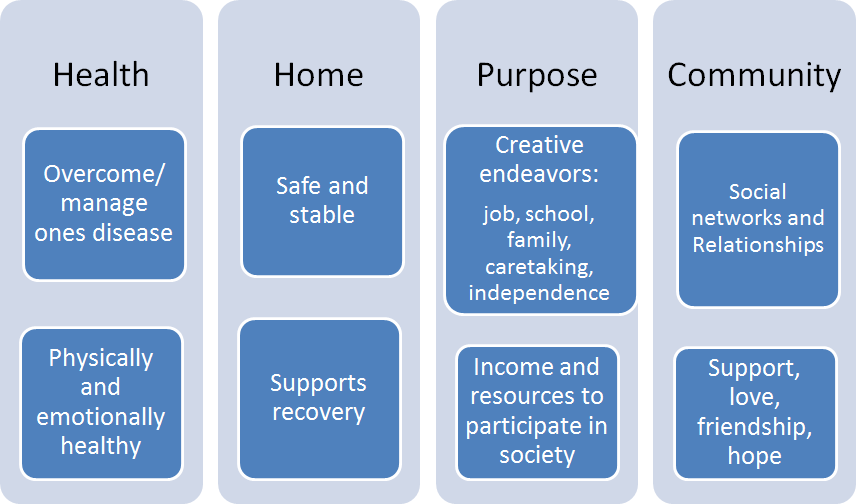The philosophy, values and principles of Recovery are the foundation of the PROS program design and of mental health care in general.
During the 1980’s and 1990’s there began a ‘perfect storm’ of changes to the mental health system and the move from maintenance and symptom management began. Through deinstitutionalization, people were moved into the community where they received community services but yet, were not thriving and being all that they could be. During this time the field transformed in other ways to include the philosophy and practice of Psychiatric Rehabilitation, supported employment, recovery, empowerment and the inclusion of peer-run services. Additionally, peers began finding their voice and began to organize self-help advocacy groups and peer-run services.
These combined changes lead to:
2003 – The President’s New Freedom Commission on Mental Health challenged America to Transform Mental Healthcare in America.
-
- Services and treatment must be consumer and family centered to give consumers real and meaningful choices
- Care is given to increase consumer’s ability to successfully cope with life’s challenges, on facilitating recovery, and on building resilience, not just managing symptoms.
What Is Recovery?
According to SAMHSA,
“Recovery is a process of change through which individuals improve their health and wellness, live a self-directed life, and strive to reach their full potential.”
The Four Domains of Recovery
SAMHSA has delineated four major dimensions that support a life in recovery:
What Are the Basic Principles of Recovery?
SAMHSA, has developed “10 Guiding Principles of Recovery”
- Recovery Emerges from Hope
- Recovery is Person-Centered
- Recovery Occurs via Many Pathways
- Recovery is Holistic
- Recovery is Supported by Peers and Allies
- Recovery is Supported Through Relationships and Social Networks
- Recovery is Culturally-based and Influenced
- Recovery is Supported by Addressing Trauma
- Recovery Involves Individual, Family, and Community Strengths and Responsibilities
- Recovery is Based on Respect
For more details on each of the above principles, please visit the SAMSHA website here.
Recovery: The Foundation of PROS
It begins with the name! Personalized Recovery Oriented Services
The New York State Office of Mental Health specifically designed this program to facilitate recovery and help people achieve their life goals. According to OMH, the goal of PROS is:
“To integrate treatment, support, and rehabilitation in a manner that facilitates the individual’s recovery.”
How Is A Recovery Model Different?
Changing Focus is Key!
Recovery moves away from looking at ‘reducing symptoms’ as the crucial component and ‘goal’ each person should have. Recovery shifts our focus from an over-value on symptom reduction to focusing on each person’s uniqueness and their personal life goals. Recovery is person-driven, respecting that each person is a partner in recovery and they determine what is best for them in their recovery process.
In the traditional Medical Model, a person is seen in the context of ‘the system’ – as a patient who has their diagnosis, symptoms, deficits and treatment needs. Programs based upon a Recovery Model recognize that in order to help people achieve their life goals, we must take a holistic perspective and understand that the person is more than just their symptoms. People have strengths and aspirations in life and we are here to help them achieve their goals.
What is the role of the professional in a recovery oriented program?
The professional is there to assist the person identify what they want to achieve to have a healthier, happier life. Although we believe that recovery can occur without professional intervention, professionals can support the people through their individual recovery process.
We can do this by using the 5 Key Recovery Concepts created by SAMSHA. They are:
- Hope
- Personal Responsibility
- Education
- Self Advocacy
- Support
Change of Focus!
| TRADITIONAL System/Provider Focus | RECOVERY Person-Centered Focus |
| Focuses on symptoms | Looks at a person’s uniqueness |
| Clients seen in context of ‘the system’ | Individual is seen in context of their communities and lives |
| Emphasizes deficits and needs | Emphasizes strengths/gifts and capacities |
| 1 expert in the room – the provider | 2 experts in the room – client and provider |
|
Adapted from Dr. Beth Mount |
How Do Providers Create A Recovery Oriented Vision?
-
Believe that recovery is possible, even from the most tragic of circumstances or disabling conditions
- Help people to uncover abandoned hopes and dreams
- Help people to discover their personhood through culture, strengths, values, skills
- Engage communities as life sustaining forces – help people connect to their community so that they rely less and less on program and begin to live as others do
- Help people re-author the way they see themselves
- Assure that everyone can reclaim a meaningful life role
Adapted from
Anthony, W.A. (1993) Recovery From mental Illness: The Guiding Vision of the Mental Health System in the 1990’s. Psychosocial Rehabilitation Journal, 16 (4).
Why Change to a Recovery-Oriented Service System?
If you are providing a PROS service, this is the foundation of the PROS design.
- People improve!!!
- People work harder for a goal that they author
- People rediscover and follow their dreams
- Power-sharing reduces staff burden
- ACA demands coordinated, active, engaging, accountable, integrated, outcome-oriented and person-centered services
- Managed Care wants successful participant outcomes and will not support inefficient, costly services that don’t encourage wellness
- Olmstead emphasizes integrated supports vs institutional services

